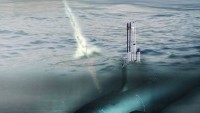Two U.S. Navy Supercarriers Patrolling Philippine Waters to Deter Chinese Attack
| Arthur Dominic Villasanta | | Jun 21, 2016 06:21 AM EDT |
USS John C. Stennis
USS Ronald Reagan
The United States has deployed two Nimitz-class nuclear supercarriers to Philippine waters to head-off any military action China might be planning following an expected adverse ruling against its claim to own practically all of the South China Sea.
China has long threatened to take military action against the Philippines, the weakest of its two foes in its fight to claim the South China Sea. Vietnam is China's other adversary but is militarily far stronger than the Philippines, especially in naval and airpower.
Like Us on Facebook
Analysts said an adverse ruling against its claim to own the South China Sea at the Permanent Court of Arbitration in The Hague might tempt China to launch a naval attack on the Philippines to send a message to back-off to the other five Asian nations claiming to own parts of the South China Sea.
Legal experts have long said the ruling by the Permanent Court of Arbitration will likely go against China. The Philippines filed this case before the court. That ruling is expected by July.
The presence of two U.S. Navy carrier battle groups should be more than enough to deter China from taking any military action against the Philippines.
The battle groups are built around the USS John C. Stennis from the U.S. Navy Third Fleet and the USS Ronald Reagan from the U.S. Navy Seventh Fleet. Units of the U.S. Navy Third Fleet responsible for protecting the West Coast of the United States were recently deployed to Asia.
Together, the U.S. Navy battle fleet patrolling off the Philippines consists of these two nuclear-powered aircraft carriers; two guided-missile cruisers and six guided-missile destroyers. Two nuclear attack submarines also accompany these warships.
The two carrier strike groups in these aircraft carriers consist of 140 aircraft, including eighty F/A-18 Hornets that can either engage in air-to-air combat or can attack naval targets such as warships of the outgunned People's Liberation Army Navy.
The battle group of the USS John C. Stennis includes the Aegis cruiser USS Mobile Bay and guided missile destroyers USS William P. Lawrence, USS Chung-Hoon and USS Stockdale.
The battle group of the USS Ronald Reagan includes the Aegis cruiser USS Chancellorsville and guided-missile destroyers USS Curtis Wilbur, USS McCampbell and USS Benfold.
This is the first two-carrier exercise in the Western Pacific in two years. The presence of the two carrier strike groups demonstrates the U.S.'s unique ability to operate tandem forces in the same area at the same time and afforded a rare opportunity for joint training "in a high end scenario," said Rear Admiral John Alexander, commander of the Reagan carrier strike group.
"We must take advantage of these opportunities to practice warfighting techniques that are required to prevail in modern naval operations," Admiral Alexander was quoted as saying.
No other Navy can concentrate this much combat power on one sea or synchronize the activities of over 12,000 sailors, 140 aircraft, six combatants and two carriers.
TagsUnited States, Nimitz-class nuclear supercarriers, Philippines, china, Permanent Court of Arbitration, USS John C. Stennis, USS Ronald Reagan
©2015 Chinatopix All rights reserved. Do not reproduce without permission
EDITOR'S PICKS
-

Did the Trump administration just announce plans for a trade war with ‘hostile’ China and Russia?
-

US Senate passes Taiwan travel bill slammed by China
-

As Yan Sihong’s family grieves, here are other Chinese students who went missing abroad. Some have never been found
-

Beijing blasts Western critics who ‘smear China’ with the term sharp power
-

China Envoy Seeks to Defuse Tensions With U.S. as a Trade War Brews
-

Singapore's Deputy PM Provides Bitcoin Vote of Confidence Amid China's Blanket Bans
-

China warns investors over risks in overseas virtual currency trading
-

Chinese government most trustworthy: survey
-

Kashima Antlers On Course For Back-To-Back Titles
MOST POPULAR
LATEST NEWS
Zhou Yongkang: China's Former Security Chief Sentenced to Life in Prison

China's former Chief of the Ministry of Public Security, Zhou Yongkang, has been given a life sentence after he was found guilty of abusing his office, bribery and deliberately ... Full Article
TRENDING STORY

China Pork Prices Expected to Stabilize As The Supplies Recover

Elephone P9000 Smartphone is now on Sale on Amazon India

There's a Big Chance Cliffhangers Won't Still Be Resolved When Grey's Anatomy Season 13 Returns

Supreme Court Ruled on Samsung vs Apple Dispute for Patent Infringement

Microsoft Surface Pro 5 Rumors and Release Date: What is the Latest?














